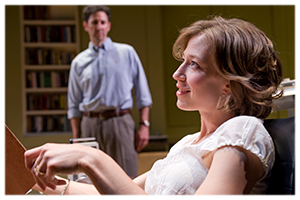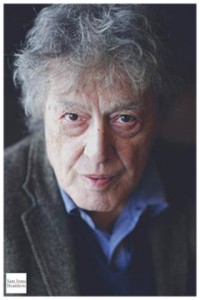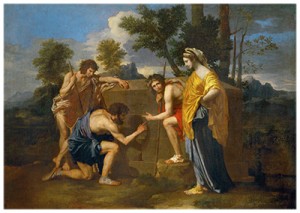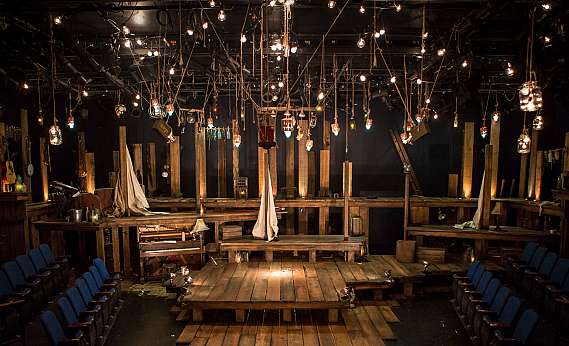
THE REAL THING at Writers Theatre in 2011
In the wake of the worldwide success of his 1982 hit The Real Thing—which WT revived in 2011—Stoppard was once again free to explore his many different passions.
Over the next ten years, he adapted classic European plays such as Rough Crossing (produced at WT in 2003) and wrote the screenplays for the films Brazil and Empire of the Sun. However, his imagination was most fiercely captivated by breakthroughs in the scientific world, and he began to purse a new desire to bring a sophisticated discussion of advancements in modern science to the stage. This passionate pursuit would culminate in what many consider to be his finest play, Arcadia.

Playwright Tom Stoppard
Stoppard’s first attempt at writing a play inspired by his interest in science was Hapgood, which premiered in London in 1988. The play was somewhat of a disappointment by the lofty standards of Stoppard’s career, failing to win any Best New Play awards. Its plot revolves around a British secret service operation passing false secrets to the Soviets during the Cold War. The focus of the play, however, as described by Stoppard scholar John Fleming, is “quantum physics and the way in which the wave/particle duality of light might serve as a metaphor for human personality.” Stoppard was fascinated with the idea that “one has a public self and a submerged self” and how that mirrors elements of quantum mechanics.
The problem with Hapgood, Stoppard believed, was “not the physics [….] it’s the story, the plot, the narrative […] all that.” Revising the play for its New York premiere in 1994, he made significant revisions that earned the play better notices, supporting a four-month run at Lincoln Center Theater. Building on what he learned from the Hapgood process, Stoppard set out to construct a plot for a new play that was dynamic enough to hold up under the weight of the ideas he was concurrently exploring.
With all of his plays, Stoppard begins with an “intellectual idea. The characters come at what is really a second or third stage. They happen when I find the story to contain the things which I want to write about.” Moving on from the quantum mechanics that he explored in Hapgood, the playwright indulged his curiosity in the emerging field of chaos theory. Afraid that chaos alone might be too abstract a concept to build a play around, Stoppard started toying with “the classification between the Classical and Romantic temperaments, or Classical and Romantic anything else—which was mirrored by developing tastes in landscape gardening, with the Lord Byron theme emerging as a knock-on from that.”
 Stoppard named his new play Arcadia after a pair of 17th century paintings by Nicolas Poussin that depict a group of shepherds in classical antiquity gathered around a tomb with the words “Et in Arcadia ego” inscribed upon it. This Latin phrase has often been incorrectly translated (including by a character in the play) to mean “Here I am in Arcadia”— with the term “Arcadia” used to represent the idea of a classical rustic paradise. A more accurate translation, however, would be “Even in Arcadia, here I am” in which the speaker (the “I”) is Death. As biographer Ira Nadel explains, “Stoppard wanted the presence of death in the title, but brevity and box-office sense prevailed: ‘death is now in the title only by imaginative extension,’ he confessed.”
Stoppard named his new play Arcadia after a pair of 17th century paintings by Nicolas Poussin that depict a group of shepherds in classical antiquity gathered around a tomb with the words “Et in Arcadia ego” inscribed upon it. This Latin phrase has often been incorrectly translated (including by a character in the play) to mean “Here I am in Arcadia”— with the term “Arcadia” used to represent the idea of a classical rustic paradise. A more accurate translation, however, would be “Even in Arcadia, here I am” in which the speaker (the “I”) is Death. As biographer Ira Nadel explains, “Stoppard wanted the presence of death in the title, but brevity and box-office sense prevailed: ‘death is now in the title only by imaginative extension,’ he confessed.”
Remarking on the complexity of his new play, Stoppard said “Arcadia is as full of theses as anything I’ve ever done, but if I hadn’t found my way into a kind of detective story, none of it would have been worth a damn dramatically. I think [Arcadia’s] the first time I’ve got both right, the ideas and the plot.”
Critics and audiences certainly agreed with the playwright. The play debuted at the Royal National Theatre in London in 1993 in a production directed by Trevor Nunn that won both the Olivier and Evening Standard Awards for Best New Play. The 1995 New York premiere at Lincoln Center Theater was also a big success, earning a Tony Award nomination for Best New Play. Critics called the play “the perfect marriage of ideas and high comedy” and “Stoppard’s richest, most ravishing comedy to date.” The critic for The Daily Telegraph wrote, “I have never left a play more convinced that I had just witnessed a masterpiece” and Arcadia went on to be one of the most-produced plays in the world throughout the 1990s.
More on Arcadia:
Articles | Production Details | Tickets


No comments yet.